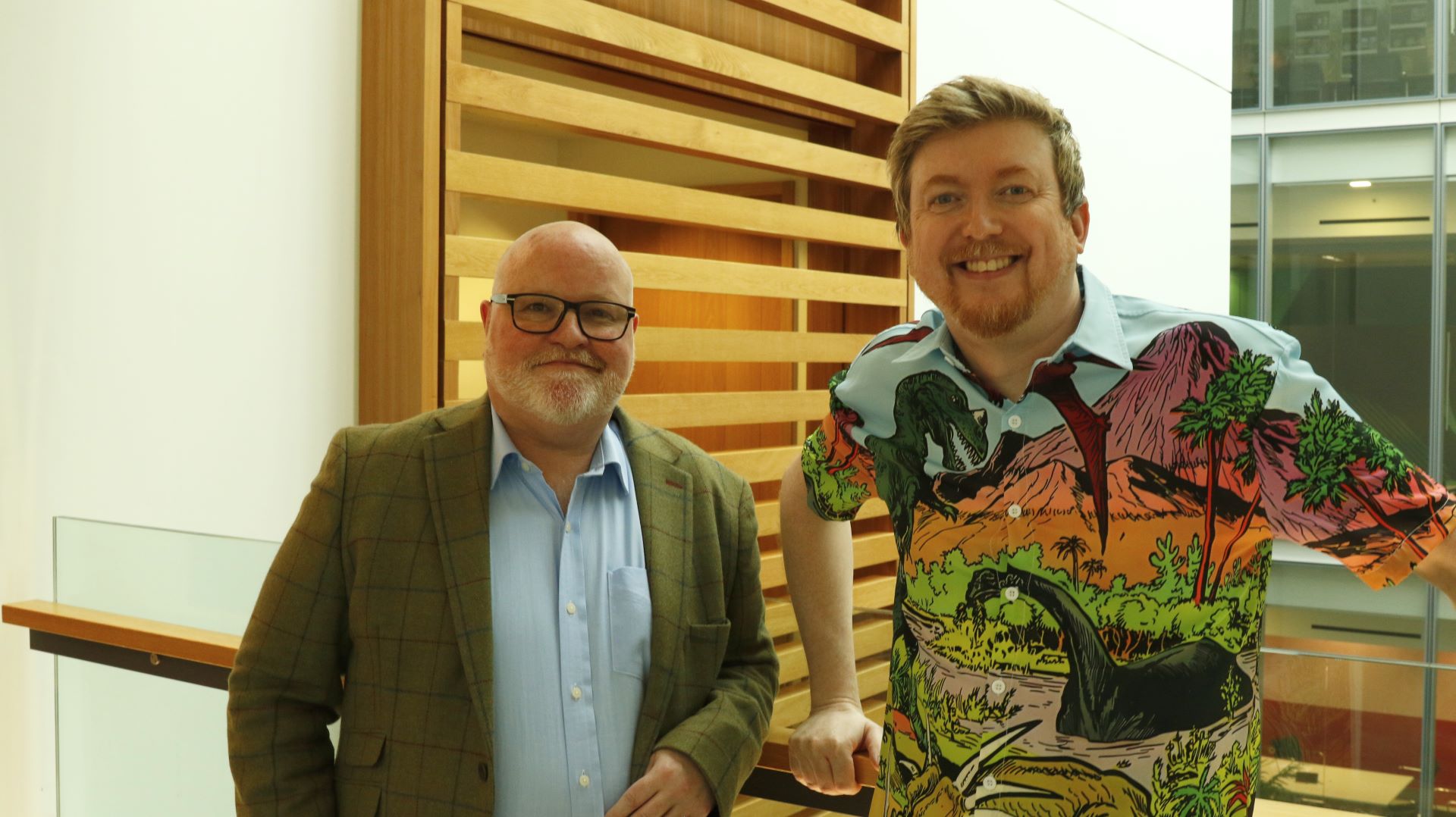Phil Clements and Paul Phillips: Championing LGBTQ+ inclusion at Omnicom Media Group UK
In partnership with myGwork

Through personal stories and professional leadership, Phil Clements and Paul Phillips from Omnicom Media Group UK (OMG) champion representation and acceptance across the business landscape and beyond, shaping a future of equity and empowerment for all.
The foundation of Phil Clements’ appreciation of cultural diversity stems from experiences as early as his childhood. From moving between the Netherlands and the UK, to a developed interest in music, art, and film from a young age, his creativity cultivated in various forms of expression – particularly writing. Phil has had a rather unconventional career journey. After starting in a band, he then transitioned to working in Universal Music’s finance department before joining OMG UK’s finance department. He has been actively involved in LGBTQ+ initiatives, such as organising events and participating in industry networks like Outvertising and Omnicom’s OPEN Pride network in the UK.
Similarly, Paul Phillips grew up in a loving working-class family where he was also exposed to a diverse mix of cultures. Raised in Nuneaton, Warwickshire, fondly referred to by Paul as “the nation’s cultural heart”, he developed a keen interest in reading and theatre from an early age. After university, Paul began his career in media sales including work for Gay Times. He has since worked across various UK agency networks, specialising in media strategy for a wide range of industries. Currently serving as a Strategy Partner and Board Member of OMD UK, he leads client planning. Paul and Phil’s coming out stories bear similarities that many LGBTQ+ readers will recognise – notably, the impact of scarce representation. Phil found solace and inspiration in the music of defiant artists like Suede, Bowie, and Pet Shop Boys, coming out at age 16. Paul’s coming out journey was marked by subtle decisions to disclose his sexuality more gradually. Initially selective about who he came out to, Paul made a more public declaration when he secured a role at Gay Times. The overwhelming support he received from colleagues and his family reinforced his confidence and sense of belonging.
“My family proved highly supportive – and still are, treating my partner like another son and brother,” said Paul. “On that first weekend my late father even joined me for drinks at Nuneaton’s only gay pub. The pub’s now long-gone – bulldozed to make way for a pay-and-display car park – but the love and support of my family still stand strong.”
Inclusivity at OMG is ingrained in the employee lifecycle. The LGBTQ+ ERG’s motto is “Pride All Year Round”, with year-long initiatives such as accessible learning resources, gender-neutral bathrooms, inclusive HR policies, and a variety of live and online events where everyone can participate. Paul added that the company also integrates inclusion into their client work. For instance, Paul’s work on OMD’s ‘The Real Britain Series’ sheds light on marginalised groups, aiming to improve authentic representation in advertising for LGBTQ+ people and other underrepresented communities.
Reflecting on the shift towards diversity and inclusion over the past decade, Phil remarks, “It’s much more on the table than it was, say ten or fifteen years ago. It’s generally accepted that it’s not only morally the right thing to do, but that it’s also good for business.” He stresses that embracing diversity and inclusion in companies enhances employee retention and performance.
“A number of our new starters have told me that they specifically asked what our company does in respect of LGBTQ+ inclusion, and the response they got was part of their decision to accept the job offer. It’s fantastic to see this change.”
Echoing Phil’s sentiments, Paul underlines the business benefits of a diverse workforce, noting a potential 25% boost in commercial performance with a representative employee profile. He urges companies to go beyond symbolic gestures and fully embed diversity, equity and inclusion into their operational models for sustainable impact.
Looking to the future of LGBTQ+ equality, Phil emphasises the need for better provision for trans healthcare by health insurance companies, including these services being integrated into health plans without excessive costs. More broadly, Phil also highlights the importance of improved healthcare systems for the trans community and the legal recognition of non-binary identities in the UK. Beyond business, Phil also notes the importance of encouraging body positivity in the community. “The LGBTQ+ community has real problems in this area. People of different body types find themselves further marginalised. It lowers self-esteem. It creates isolation. It encourages eating disorders. But the problems are endemic in our society, and they go back hundreds of years. There’s a lot to unpick, so the sooner we all start, the better.”
With a similar perspective on progression, Paul advocates for structural changes within organisations to promote LGBTQ+ equality. He suggests that corporate business and public sector organisation must have board-level representation from every diversity, equity and inclusion group – ensuring marginalised voices are heard at the decision-making level.
Omnicom Media Group UK is a proud partner of myGwork, the LGBTQ+ business community. Find out more about job opportunities at Omnicom Media Group UK.
